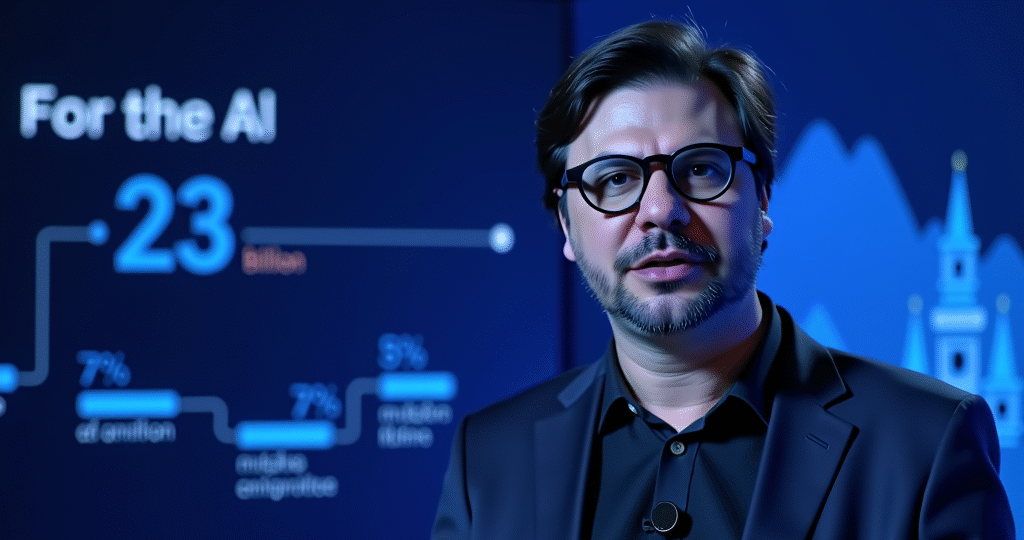AI Radar: Brazil Announces R$ 23 Billion Plan While Court Rejects Appeal with False Case Law
April 28, 2025 | by Matos AI

Brazil has finally taken a decisive step in the global race for artificial intelligence. During the Web Summit Rio, Minister Luciana Santos announced that the Brazilian government plans to invest no less than R$23 billion in AI by 2028 – an amount that, according to her, is on par with the investment made by European countries in this technology.
This is a turning point for the Brazilian innovation ecosystem. After years of following global technological developments, I have been warning about the need for Brazil to position itself strategically in this field. The announcement of this plan represents not only an injection of resources, but also the signaling of a state policy for technological development.
The Brazilian AI Plan: beyond the numbers
The investment of R$23 billion is significant, but what really matters is how these resources will be applied. According to the Minister of Science, Technology and Innovation, the focus will be on developing solutions for strategic areas such as agriculture, public services, education and health.
Join my WhatsApp groups! Daily updates with the most relevant news in the AI world and a vibrant community!
- AI for Business: focused on business and strategy.
- AI Builders: with a more technical and hands-on approach.
One point that deserves to be highlighted is the development of 35 software solutions in Portuguese that will use this technology. This is essential. In my career supporting more than 10 thousand startups, I realized that one of the biggest challenges for the adoption of AI in Brazil is precisely the lack of solutions adapted to the Brazilian linguistic and cultural context.
Another element mentioned was the Santos Dumont supercomputer, one of the 100 most powerful in the world, installed in Rio de Janeiro. Computing infrastructure is essential for the development of globally competitive AI models. While countries like the US and China invest billions in chips and processors, we need to ensure that Brazil does not fall behind in this race for computing capacity.
AI in Brazilian daily life: from retail to the office
While the government is moving in the field of public policies, the market is already transforming the Brazilian consumer experience with AI. The Brazilian tool Doris, for example, allows you to simulate how clothes would look on users with high accuracy, revolutionizing the shopping experience, especially in physical stores.
In the professional field, Generative AI platforms are being adopted as affordable alternatives to traditional career coaches, offering personalized advice for resumes and interviews. It's the kind of application that democratizes access to services previously only available to those who could afford specialized consulting.
In the field of programming, AI tools are transforming coding, making it accessible to people without prior technical knowledge. The promise is that in the future, programming can be done solely through natural language interaction. This democratizes software development, but also raises questions about code quality and data security.
The challenges of AI: from “stress” to hallucination
Not everything is rosy in the advancement of AI. An emblematic case occurred recently when The Paraná Court rejected an appeal created with artificial intelligence that invented 43 non-existent case laws. The judge harshly criticized the defense, emphasizing the obligation of lawyers to review AI-generated materials.
This case illustrates one of the biggest challenges of generative models: hallucination. When AI creates false information that appears to be true, the result can be disastrous, especially in sensitive contexts such as the legal field.
Another interesting study revealed that AI systems, when exposed to distressing narratives, can develop an internal state similar to human stress. This raises questions about how human emotions can be related to AI and how this impacts the quality of the responses they provide.
In the tax field, A recent study analyzed the risks of hallucinations in Large Scale Language Models (LLMs), which can generate unverifiable information, putting the integrity of tax justice at risk.
The Human Side of AI
An often overlooked aspect of the AI debate is the human work behind the algorithms. Brazilians are being paid to train artificial intelligence not to suggest problematic phrases and to speak correctly about sensitive subjects.
This approach highlights the importance of human input in the ethical evolution of AI, which alone is incapable of categorizing and guiding appropriate information. The need for transparency about how AI models work is critical to preventing unwanted biases and ensuring that the technology is used for good.
The Future of Work: What Bill Gates Says About Irreplaceable Professions
The debate over automation and job replacement continues to rage. Bill Gates recently highlighted professions that remain irreplaceable by AI, emphasizing the importance of emotion and human interactions. Areas such as education, health and creative professions still require skills that go beyond automation.
In my experience with the future of work, I have advocated the development of what I call CACACA skills: Creativity and Autonomy; Collaboration and Adaptability; Connection and Affection. These are precisely the skills that Gates highlights as irreplaceable.
However, an article from Poder360 warns that AI has gone from being a supporting role to taking on a leading role in the architecture of human decisions. Algorithms not only automate choices, but also codify them, redefining who (or what) exerts influence on decision-making processes.
Brazil’s role in the new geopolitics of AI
The announcement of the Brazilian AI Plan cannot be seen in isolation. It is part of a geopolitical context in which the US and China are competing for global leadership in technology. Brazil, as the largest economy in Latin America, has the opportunity to position itself as a regional hub for AI innovation.
The investment of R$23 billion by 2028 is comparable to what European countries are doing, according to Minister Luciana Santos. This puts Brazil in a competitive position, but we need to go beyond financial resources. We need an ecosystem that integrates universities, companies, startups and government around common goals.
In my career supporting the development of innovation ecosystems, I have learned that having resources is not enough – you need to have a strategy, qualified people and a regulatory environment that encourages innovation without compromising fundamental values such as privacy and security.
What this means for Brazilian entrepreneurs and professionals
If you are an entrepreneur or professional looking to position yourself in this new scenario, some points are fundamental:
- Continuous training: The skills needed to work with AI are constantly evolving
- Ethical vision: Develop solutions that balance innovation and responsibility
- Focus on local issues: Take advantage of opportunities to develop solutions adapted to the Brazilian context
- Collaboration: Seek partnerships that complement your capabilities
In my mentoring programs, I have helped entrepreneurs navigate these complex waters, identifying opportunity niches and developing strategies that take advantage of the current moment of technological transformation. The window of opportunity is open, but it will not remain that way indefinitely.
Conclusion: a decisive moment
Brazil is facing a decisive moment in the global AI race. The announcement of a R$23 billion investment signals national ambition, but the challenges remain enormous: training talent, developing infrastructure, stimulating innovation and regulating the sector in a balanced way.
The history of technology teaches us that it is not enough to arrive late – we must arrive differently. Brazil has the opportunity to build its own AI development model, which takes advantage of our competitive advantages and addresses our specific challenges.
In my work as a mentor and consultant to startups and companies undergoing digital transformation, I have emphasized the importance of a strategic approach to AI. It’s not just about adopting the technology, but about rethinking it based on our needs and values.
The future of AI in Brazil is being written now. And you, how do you intend to participate in this story?
✨Did you like it? You can sign up to receive 10K Digital's newsletters in your email, curated by me, with the best content about AI and business.
➡️ Join the 10K Community here
RELATED POSTS
View all



